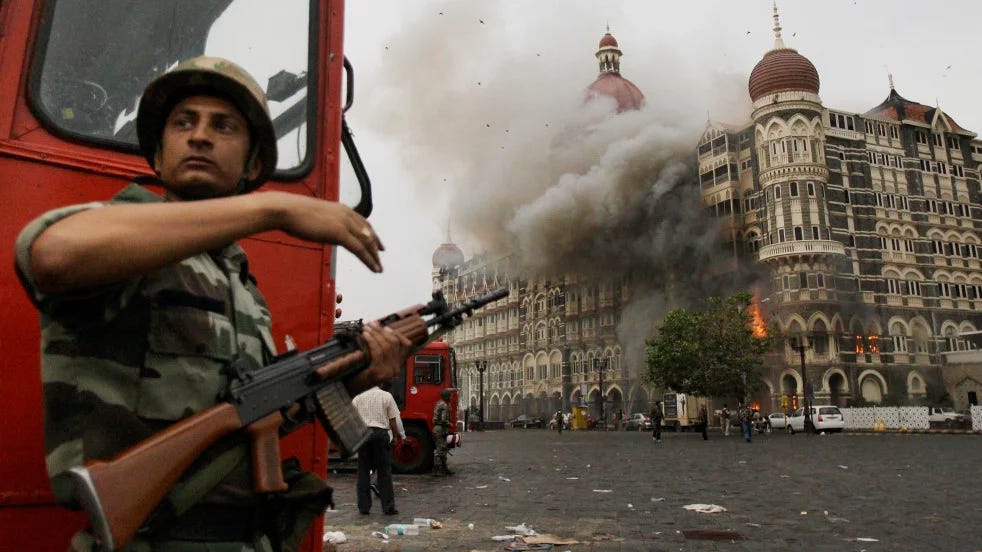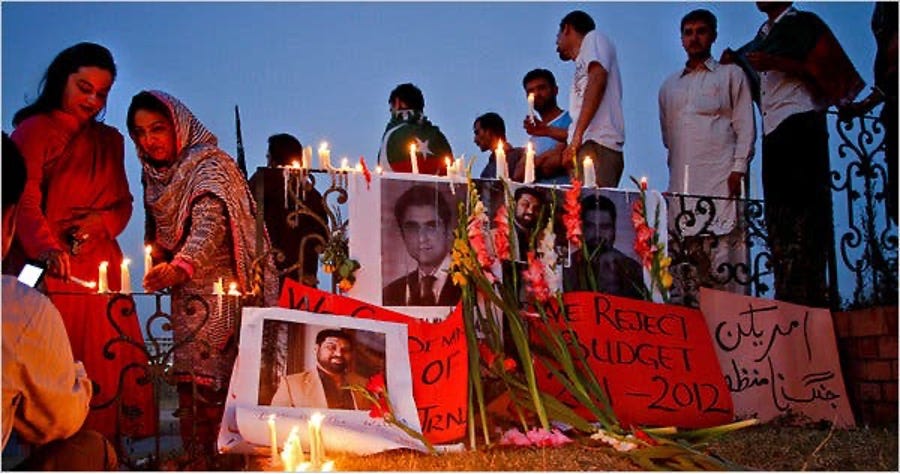The ISI: Pakistan’s Rogue Deep State
Pakistan’s Inter-Services Intelligence (ISI) has sweeping powers domestically and internationally. Its rogue actions have resulted in significant blowback for Pakistan, and the world.
The iconic Taj Hotel in Mumbai, India, one of the multiple locations targeted in a 2008 large terrorist attack allegedly directed by the ISI. Image Source
Pakistan's Inter-Services Intelligence (ISI) agency is frequently at the center of controversy, both domestically and abroad. In India, authorities arrested an employee of a government contract-holding firm on suspicion of divulging sensitive details on India's military drone program. A female agent of the ISI had set up the alleged 'honey-pot' operation. In Pakistan, multiple judges now allege that ISI agents abducted and tortured their relatives to coerce favorable outcomes on 'politically consequential' cases. Meanwhile, the Pakistani Army continues to investigate allegations that the former ISI chief had abused his power while in office.
A longtime supporter of radical groups both domestically and internationally, the ISI is arguably one of the world's most potent terror threats. Given its protection by the Pakistani military, bringing the organization to heel remains a near impossibility in a country locked in a perpetually spiraling crisis.
ISI Insignia. Image Source
From Domestic Necessity to Global Player
The Pakistani government formed the ISI in 1948 amidst a brutal war with India following the bloody Partition of the two countries. Originally conceived as an intelligence agency focused on external threats - primarily India - the ISI's mandate expanded greatly in subsequent decades, especially in the 1970s and 1980s. This expansion led to a significant rise in the ISI's role and influence within Pakistan and abroad. The ISI officially operates under the jurisdiction of the Pakistani military. Its primary focuses include external intelligence gathering, counterintelligence, and covert operations.
Pakistan's relationship with the United States brought the ISI to international prominence. During the Soviet occupation of Afghanistan in the 1980s, the ISI served as the primary conduit for funding between Washington, its Gulf partners, and the Afghan Mujahideen. Later, in the 2000s, the ISI served a crucial role during the US-led invasion of Afghanistan and the Global War on Terror. Over the years, the US Central Intelligence Agency (CIA) looked the other way when the ISI used drug money to finance and spread jihadist ideologies in Afghanistan. The ISI also reportedly channeled funds into the creation of madrassas (religious schools) in northwest Pakistan, sometimes without oversight from the Pakistani military. For these reasons, the ISI played an outsized role in shaping current politics in both Pakistan and Afghanistan.
The ISI reportedly trained former Afghan Taliban leader Mullah Omar, who died in 2013. In Afghanistan's current Taliban-led de-facto government, Interior Minister Sirajuddin Haqqani – leader of the infamous Haqqani network – and various other Afghan Taliban leaders are graduates of Pakistan's Darul Uloom Haqqania madrassa, infamously known as the 'university of jihad.' It was also at this madrassa where conspirators – potentially including agents of the ISI – allegedly plotted the 2007 assassination of former Pakistani Prime Minister Benazir Bhutto.
Apparent connections between the ISI and the Taliban caused Washington's perception of the organization to shift in the late 2000s. In 2011, Joint Chiefs Chair, Admiral Mike Mullen openly accused the Taliban Haqqani Network of being an arm of the ISI, claiming that the ISI helped to facilitate several Haqqani-led attacks on US forces that year, including a truck bombing at a NATO base that killed 77 US service members. That year, a leaked US document listed the ISI, along with the Afghan Taliban and Al-Qaeda, as "terrorist and terrorist supporting entities identified by associated forces." A 2009 US leak also stated that officials from the ISI maintained links with and supported a wide array of other extremist organizations.
Although the ISI allegedly viewed the Afghan Taliban's 2021 takeover as a success for Pakistan, they proved mistaken, and the new Taliban regime has resulted in significant blowback for the country. This strategic backfire is even more dangerous when considering the global context of ISI operations. In India, the ISI continues to play a significant role where it supports several Islamist groups currently active in Kashmir, Sikh nationalists in the Khalistan-Punjab insurgency and allegedly played a critical role in the 2008 Mumbai attacks that killed over 100 people and injured hundreds of others. The ISI continues to pose a significant threat to India. On March 1, a blast killed nine people at a café in India's technology hub of Bangalore. Indian authorities are investigating alleged links between the attackers and the ISI.
The ISI's influence also extends beyond South Asia. For example, the agency's support for ethnic Bosnian Muslims during the Yugoslav Wars caused the International Criminal Court (ICC) to summon a former ISI chief to the Hague; Pakistan refused the request. The ISI reportedly sent operatives to the US to intimidate members of the Pakistani diaspora critical of the government in Islamabad. In 2011, the then-ISI chief visited with Chinese defense officials who publicly accused Pakistan of involvement in attacks in Xinjiang that year. One former ISI chief also claimed the organization supported Muslim rebel groups in the Philippines under his tenure.
"By exporting violence, they [Pakistan] have eroded their internal security and their position in the region. They have undermined their international credibility and threatened their economic well-being."
- Admiral Mike Mullen, former Chair of the Joint Chiefs of Staff
The ISI chief (suit with orange tie), with Pakistan's then-foreign minister and Taliban co-founder Mullah Abdul Ghani Baradar in a meeting in Islamabad in 2020. (Image Source)
An Institutional Behemoth
The broad powers of the ISI have cemented the organization's role in Pakistani politics, ensuring the de-facto rule of the Pakistani military. The West helped facilitate this role as it viewed the Pakistani military as a regional bulwark against communism at a time when India enjoyed close relations with the Soviet Union and led the Non-Aligned Movement. As such, the ISI played integral roles in Pakistan's 1958 and 1977 coups, providing intelligence and logistical support to senior military leaders. During periods of nominal civilian rule - including in the post-Musharraf era from 2008 to the present day – military leaders have relied on the ISI to manage Pakistan's 'democracy,' including influencing elections.
Pakistan's military establishment propelled former Prime Minister Imran Khan to power in 2018, forcing then-Prime Minister Nawaz Sharif to exile for corruption. When Khan seemingly interfered in selecting the new ISI chief in 2021, he fell out of favor with the top brass, who orchestrated his ouster in a no-confidence motion. With Khan imprisoned and his party suppressed in the latest election, Nawaz Sharif has returned to power with his brother as prime minister – all with the assent of the military and ISI. While keeping the military in power, the ISI continues to support and advocate on behalf of some of the most retrograde elements in Pakistani society, such as Tehreek-e-Labbaik Pakistan (TLP), which recently killed a Christian man in a mob lynching.
Pakistan's military remains firmly in charge of the country, controlling some of its largest and most lucrative business interests. The ISI helps to facilitate this in many ways, even going so far as to funnel as much as half the money given to it by the US to fight the Soviets toward funding Pakistan's nuclear weapons program. Because the ISI does so much to keep the military in power, the top brass tolerates many of the ISI's less desirable activities, including previous support for domestic threats such as the Pakistani Taliban and massive corruption. As such, the military has actively resisted attempts to reform the ISI, including revoking a 2008 attempt to bring the organization under the control of the interior ministry within hours. For these reasons, the ISI will likely continue to operate with little or no oversight and with near total impunity for the foreseeable future.
A vigil for slain journalist Saleem Shahzad, who was allegedly tortured and killed by the ISI for writing about the relationship between Pakistan's military and militants. Image Source
Conclusion
The ISI's value to the military ensures its practically free reign over Pakistan's domestic and global interests. Its ties to jihadist elements, access to funds, and apparent lack of judgment make it a regional and global threat. Its near-total lack of oversight ensures the continued victimization of Pakistani citizens, especially those from its media and civilian institutions. Although Western governments increasingly recognize the threat posed by the ISI, it will likely remain a global threat for the foreseeable future.







